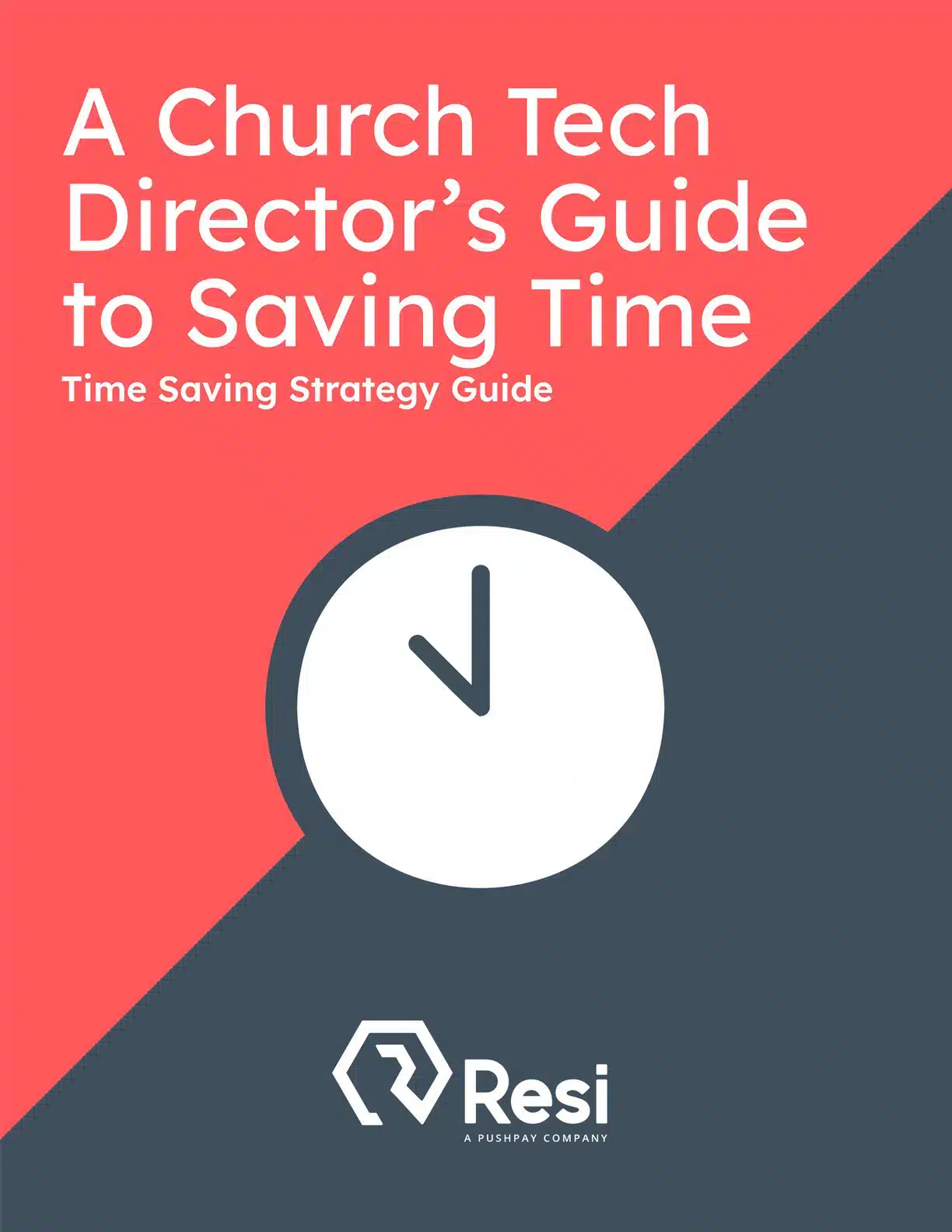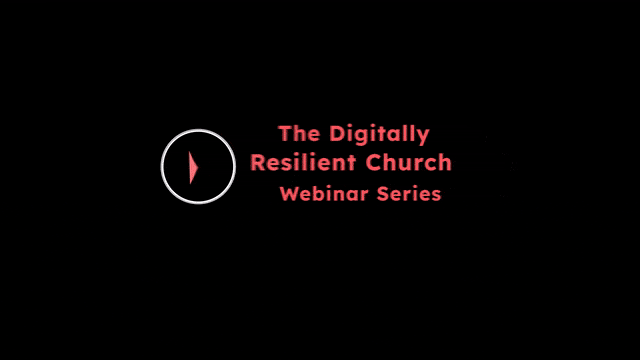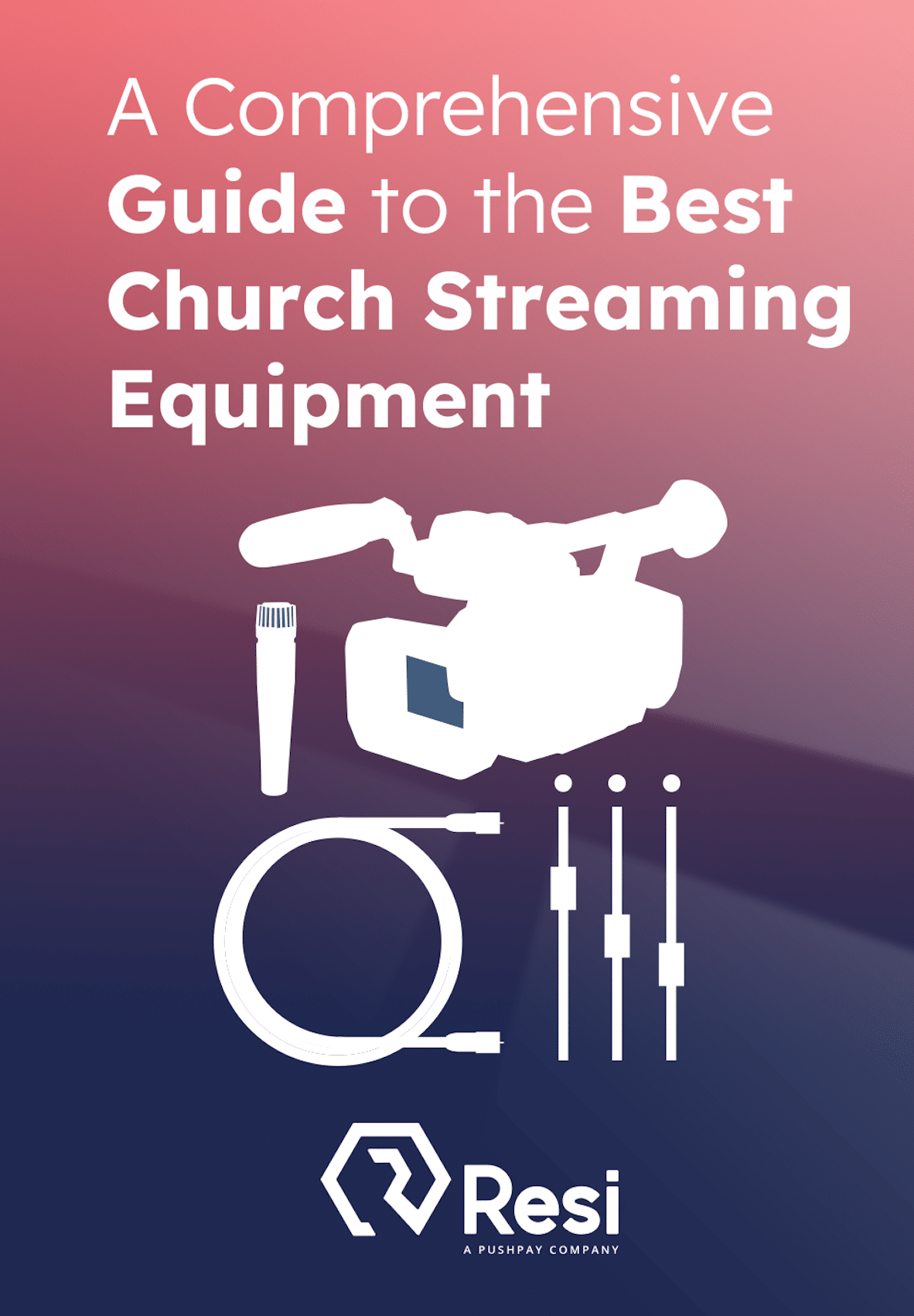
At the beginning of every year, gyms fill up with enthusiastic people who have set health goals for the new year. They’re determined to get back into shape, lose weight, and maintain a healthier lifestyle. But by mid-March, the enthusiasm has faded away, and people start to give up on their goals. The gym is empty again, and fitness classes are almost deserted.
What happened? And what does this have to do with your church?
First of all, people are notoriously bad at building new habits. That’s why New Year’s resolutions rarely pan out. According to a poll conducted by Forbes, the average resolution lasts only 3.74 months into the new year.
Pretty depressing, huh?
Well, the same thing tends to happen at most churches. Every January, after the mad sprint that is the Christmas holidays, many churches regroup, take a breather, and set goals for the new year. And most—if not all—of those goals often directly involve the attention of the tech director and the media team.
Maybe this is the year your church finally breaks that attendance barrier. Maybe it’s the year leadership fully invests in a high-definition livestream experience . Maybe it’s upgrading the worship tech and stage setup. Maybe it’s committing to that capital campaign to build out a family life center.
Whatever it is, the same obstacles that hold people back from attaining their New Year’s resolutions also prevent churches from doing the same. By mid-March, those lofty goals and expectations have fallen to the wayside in favor of “business as usual,”
Thankfully, understanding the primary reasons resolutions fail can help you (and your church) set better goals and—most importantly—achieve them.
#1
Unrealistic Expectations
One of the main reasons people give up on their resolutions is that they have unrealistic expectations of themselves. They expect too much too soon and don’t give themselves enough time to meet their goals.
Back to the gym example from the introduction: Getting into shape is hard. Losing weight and building muscle takes time and a generous dose of discipline. So, when someone shows up to the gym three times a week for a month and only loses a couple of pounds, that goal of losing 30 pounds for that spring break cruise becomes pretty demoralizing. It’s no wonder people give up.
The same holds true for churches.
Let’s say one of your goals is to increase your online and in-person attendance. On the surface, this is a great goal. But it also needs to be a little more specific. After all, if just one additional person joins your church or livestream, then you’ve technically already reached your goal (cue the balloons and confetti). But that’s not what you probably mean when you say “increase attendance.” To make this goal achievable in a consequential sense, you’ll need to attach a number or percentage to make it more specific—like “200 new average livestream viewers” or “25% increase in average weekly in-person attendance.”
However, don’t make the mistake of overestimating what’s possible—especially within a specific amount of time. We’re all for big goals and dreams, but setting an unrealistic goal can quickly become a crushing weight that never relents and always disappoints, likely forcing your church to quietly shelve the resolution for next year.
#2
Failing to Make the Goal Measurable
This mistake is closely related to unrealistic expectations, but it’s important enough to warrant its own section.
For a goal to be achievable (and motivating), it must also be measurable. As I said above, “being healthier” isn’t a real goal—it’s an aspiration—just like “increasing attendance” or “improving livestream.” So, after making sure your church’s goal is specific and realistic, you need to make sure it’s measurable—and determine how you’ll measure it.
This is where having access to accurate and actionable analytics comes into play. Gone are the days when you could just count the empty seats in a sanctuary and tally up this week’s offering. Attendance, giving, and engagement now depend on a host of additional factors that can’t be measured by hand.
To truly measure and track your church’s progress towards its goals, you need reliable data. This includes information on attendance, giving, online engagement, social media metrics, and more. With this data in hand, you can gain valuable insights into the effectiveness of your strategies, spot trends, and make informed decisions for future growth.
At Resi, we’re fully committed to giving you and your team the type of data and analytics necessary to make the right decisions. When it comes to your livestreams, our latest product—Resi On Demand—offers Library Analytics, where you can track the performance of your uploaded videos and streamed sermons. You can see which messages are resonating with your congregation and measure the reach of a sermon series beyond your community. Additionally, with Library Analytics you can go beyond the basics to measure data points like average watch time, viewer location, new viewers, and breakdown viewer stats by device type, resolution level, and region.
Whether you’re interested in seeing a holistic summary of all of your videos, or want to take a closer look at individual metrics, this feature offers vital insight to help you tailor your content and engage your audience.
#3
Lack of Time Management
When it comes to New Year’s resolutions, most people give up for one simple reason: they’re bad at managing their time. And this makes sense. Most resolutions require drastic lifestyle changes, and establishing new routines after years of embedded behavioral feedback loops can make achieving that goal more of an effort than was initially expected.
Taking Back Monday: A Church Tech Director’s Guide to Saving Time
With this resource, you can take back time on Mondays and focus on what matters most—serving your ministry.
Download for free!
A lot of this comes down to time—but maybe not in the way you expect. Within a church setting, all of those “old routines” you’re probably trying to streamline have some sort of purpose. And that means your biggest threat to your church’s goals might be “the way we’ve always done things.” As anyone who’s worked in any sort of organization knows, change takes time. From the adoption of new technology to the shifting of roles, your church’s goals will probably create a little bit of friction among the staff and volunteers. So, a big question you’re going to have to ask yourself and your team is, “How are we going to create space and margin in our schedule to pursue these goals?”
An easy way to kill two birds with one stone—introduce new tech and save time—is to invest in technology that enhances your ability to automate pre-existing processes, especially those related to pre- and post-production. As we mentioned in a previous blog post about automations and time management, you can enhance efficiency, consistency and creativity, save resources, and improve your team’s quality of life by automating tech processes that no longer require a hands-on approach.
Thankfully, Resi has a number of products and features that can help your church save time, increase efficiency, and deliver top-tier online experience for your congregation and visitors. For instance, you can effortlessly schedule recurring events such as weekly church services to stream automatically every week. This ensures a seamless online experience without the need for weekly maintenance. Simply set it up once and let it run in the background, allowing you to redirect your focus towards more urgent matters or creative endeavors.
#4
No Accountability or Support
This one is huge. Studies show that people are far more likely to stick to their fitness resolutions when they join a group, rather than go it alone. The same is true for pursuing new goals with your church staff and volunteers.
It’s hard to stay motivated when you’re surrounded by people who don’t share your goals or don’t understand your motivation. Therefore, it’s essential to surround yourself with like-minded people who can provide encouragement, accountability, and motivation when you need it most. Now, this is easier said than done, but you should try your hardest to get your church’s leadership, staff, and volunteer core onboard with your vision for the church in the new year. It’s absolutely vital you don’t try to go at it alone—not only are you likely to burn bridges, but you’ll probably burn out as well.
This means being transparent about your goals, sharing the why behind your vision, and getting feedback from others. You may want to consider setting up a weekly email or system to let higher-ups or church elders know progress toward the goal is (or isn’t) progressing. Not only will this increase accountability, it could be a pathway toward constructive feedback and opportunities you may not have not come across on your own.
#5
Fear of Failure
People often give up on their resolutions because they’re afraid of failing. It’s sad, but true. They don’t want to face the disappointment of not reaching their goals, so they quit before they even begin or shortly after they start.
Your church’s history is likely filled with failed goals and unmet expectations. That’s okay. That’s every church—but don’t let the possibility (or even likelihood) of failure dissuade you from setting goals and pursuing them to the best of your ability. Instead of focusing on the potential for failure, try to focus on the benefits to your church and community if you and your team succeed. Even if you fail to reach a specific milestone, take what you’ve learned and apply it to the next attempt or strategy. Keep in mind that it’s always better to try and fail than not to try at all.
And, remember, you don’t have to do this alone.
The reasons why people give up on their goals vary from person to person, but the solutions are the same: set realistic expectations, seek support and accountability, keep it measurable, prioritize time management, and don’t give up if you slip. Staying motivated throughout the year requires effort, determination, and the willingness to adapt and change as needs arise. With the right mindset and support, your church can achieve its goals, and everything you achieve can be used to build a better foundation for the next year.
Interested in learning how Resi can help your church achieve its goals in the new year? From higher-quality livestreams to automating production processes that save your team hours every week, Resi is here to streamline your workflows, increase engagement, and help you reach more people. Reach out to one of our tech specialists today and schedule a free demo to see how Resi can revolutionize your church’s production output today.







